EverQuest II Updated Q&A - How EverQuest II Will Be Different
Lead Content Designer Chris Cao explains what you can expect to see in the sequel to one of the most popular and influential online games ever made.
The world of massively multiplayer online games was forever changed when a developer named Verant Interactive released EverQuest in 1999. The game's colorful 3D graphics and immersive atmosphere addicted thousands of players to creating virtual adventurer characters, hunting monsters, acquiring treasures and experience levels, and chatting with other players in groups while adventuring. It's five years later, and Verant Interactive is now Sony Online Entertainment--a studio hard at work on EverQuest's sequel, EverQuest II.
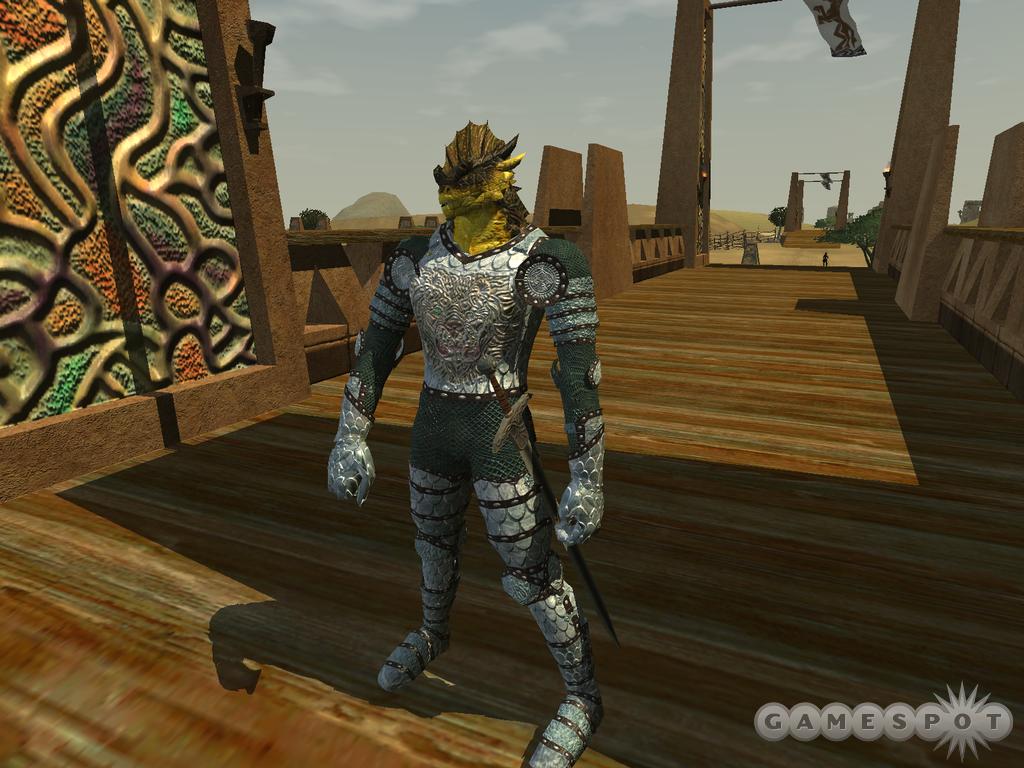
EverQuest II will attempt to draw in both new players and EverQuest veterans by expanding on the lore of the original game's fantasy world of Norrath while also being more accessible to beginners. EverQuest II takes place in a postapocalyptic version of Norrath, centuries after the events in the first EverQuest game and after the moon has crashed into the planet's surface, thus leaving behind only a few civilized areas and many unanswered questions. However, the sequel will also attempt to be easier to understand to new players by allowing them to gradually develop their characters over time rather than allowing them to make a bunch of confusing and uninformed choices when starting a new game (and then regretting them later). Essentially, when creating a new character, you'll pick your race and your name, and then you'll get started. Your actions will eventually help you determine what kind of character you'll end up with. We caught up with Sony Online Entertainment's Lead Content Designer Chris Cao for more information.
GameSpot: Could you give us an update on the development of EverQuest II? How far along is the game at this point? What parts of the game is the team currently focusing on?
Chris Cao: The game is in production stages. We're using scheduled milestones to add new content, and we test the game on a regular basis. Most recently, we've been focusing on "instanced" events (events that take place for individual players rather than for the entire world at large) and special scripting to bring our cities to life. The art team has been adding and refining character animations, as well as creating a huge number of detailed spell effects. The game gets more and more polished every day as we draw closer to beta. The core game is very strong, and we are in a phase where we continue to build upon that.
GS: We've already heard that EverQuest II takes place many years after the events in the original game and after the moon of Luclin has crashed into Norrath. However, familiar locations like the cities of Qeynos and Freeport, which appeared in the first game, remain. Could you describe in more detail how the world has changed?
CC: In order to understand the scope of the changes that have affected Norrath, it's important to realize that an entire "Age of Cataclysms" has occurred. While "The Shattering"--the collision of Luclin with Norrath--was the most recent (and in some ways the most devastating) of these occurrences, it is not the only world-changing event that the planet has endured. World wars, divine meddling, and magical catastrophes have all done their part to change the face of Norrath to alter the destinies of its people.
At release, players will explore the echoes of these events as they travel through what remains of the original EverQuest's continent of Antonica. Broken into multiple subcontinents, Antonica retains some familiar points of interest. But the 500 years of history have changed many of these famous locales in one way or another. Rivervale, for instance, is a far different place than its bucolic and peaceful history would indicate.
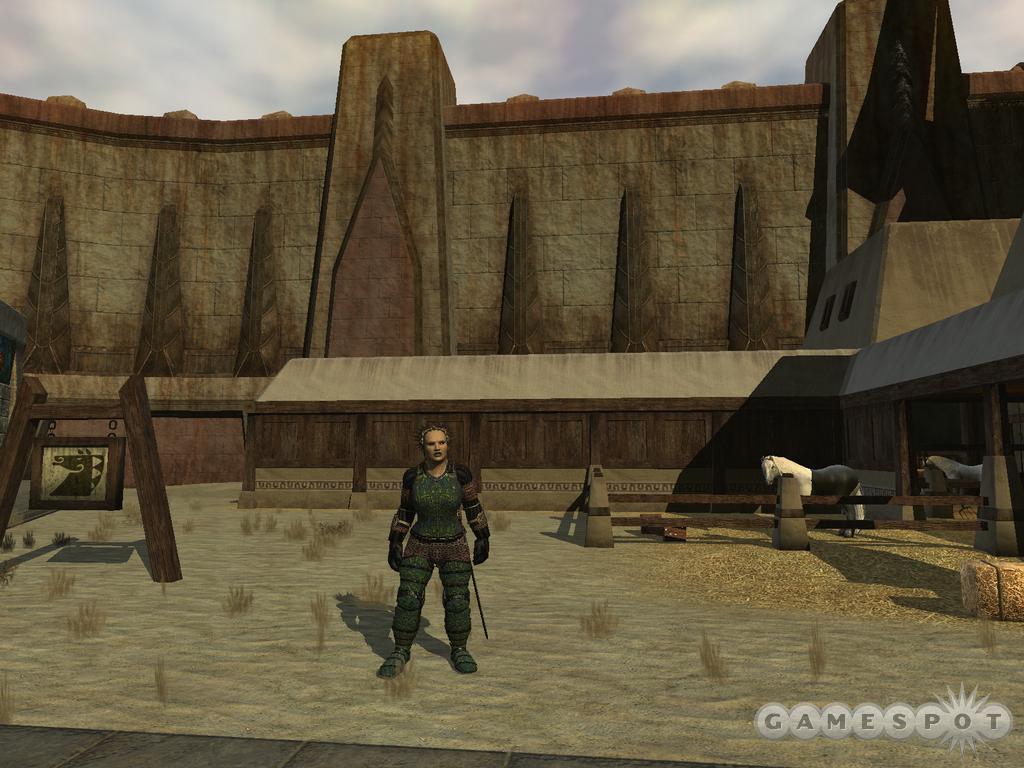
GS: For that matter, could you describe how the world of EverQuest II has been planned to change over the life of the game? What are some specific examples of the changes and additions that the team has planned for EverQuest II? For instance, in the original game, members of Sony Online's development staff would participate in "live" events. Will there be new continents and dungeons to explore? Others?
CC: By limiting the world to a shattered Antonica at release, we've left ourselves a lot of world to expand upon. But beyond pure geography, EverQuest II offers up several mysteries for players to solve. What happened to the wizard spires? Can they be restored? Where did the gods go, and why is divine magic still functional despite their [the gods'] silence? What forces continue to act against the survival of the mortal cities? Players will find (and in some cases create) the answers to these questions through live and expansion content.
Getting Started in EverQuest II
GS: Tell us about the game's races. We know that the sequel will have an all-new "evil" race--the ratonga--but how will the races themselves play in the sequel, and how will they be different than they were in the original game? What kind of racial abilities can we expect to see from EverQuest II's new races, and if the game doesn't have a racial experience penalty, how will different races remain balanced choices?
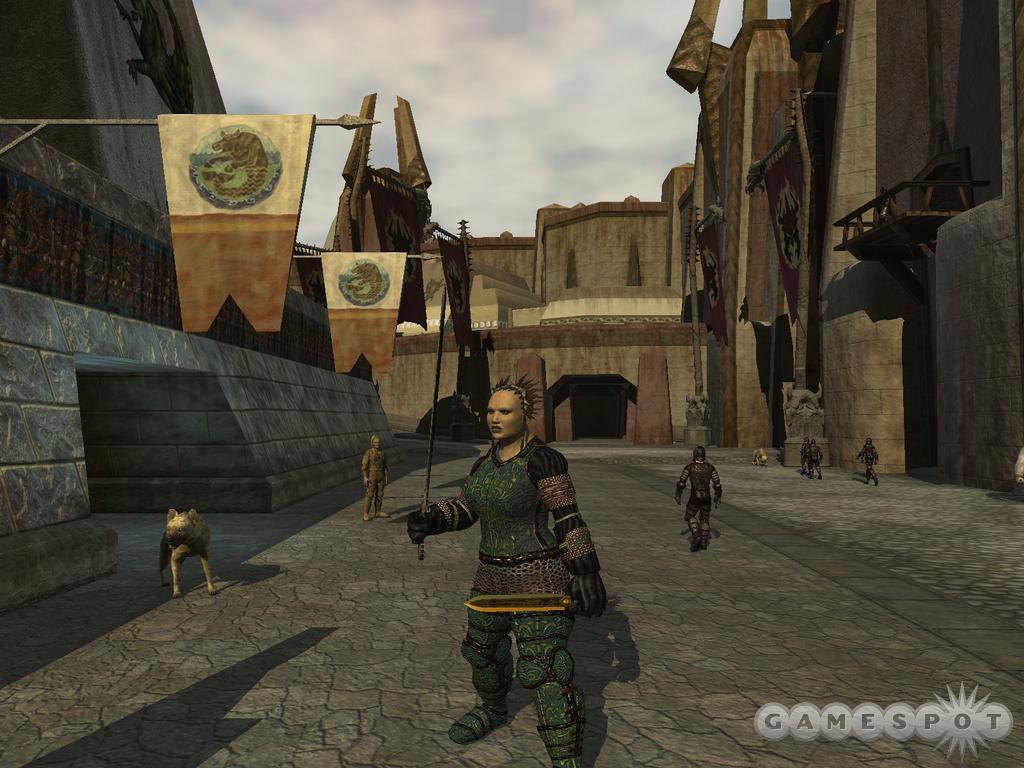
CC: You could say that sometimes the original EverQuest's racial traits were differences of "kind" rather than of "degree." That is, there were certain abilities that set other races apart rather than just differences within a common set of attributes, like simply having more strength or more dexterity. This led to the perception (and in some cases the reality) that certain races were the best for a given class. We feel that we can avoid this issue by varying a race's abilities within a given set of balanced characteristics.
Because of this, the gameplay differences between the player races in EverQuest II will center on vision types, languages, starting abilities, and resistances. That is, characters will still have "stats"--numbers that track different attributes--and they'll all have the same total number of starting stat points, but these points will be distributed differently for each race. Ogres, for example, are several times as strong as gnomes. This will initially make ogres more efficient fighters than gnomes, but this doesn't mean that gnomes can't ever catch up, because they can--especially if they can find magic armors and other items that can augment their strength.
GS: Tell us about the game's professions system. We know that you'll start the game without any kind of character class (so no paladins, wizards, or anything else at the beginning), and then you'll choose a basic class at level 10 and a specialized "subclass" at level 20. Why did the team decide not to force players to choose a class at the beginning? And what about advanced players who already know what class they want to specialize in?
CC: You could say that our style of choosing classes is like an inverted pyramid. We chose to go this way for two main reasons. The first was to give players a chance to learn about their character's main abilities without worrying about specialized differences between different classes. We wanted players to become good at their main job before slowly ramping up to the full complexity a subclass can offer.
The second reason for this system is that we are trying to attract a new audience. Many of the genre-specific terms and concepts that a fantasy game presents are unfamiliar to the average gamer. It's easier, for example, for a new player to understand what a fighter does than to have to assimilate all the aspects of being a "paladin." By restructuring the presentation of gaming terms and gameplay complexity, we can introduce the genre to new players and allow them to grow into it.
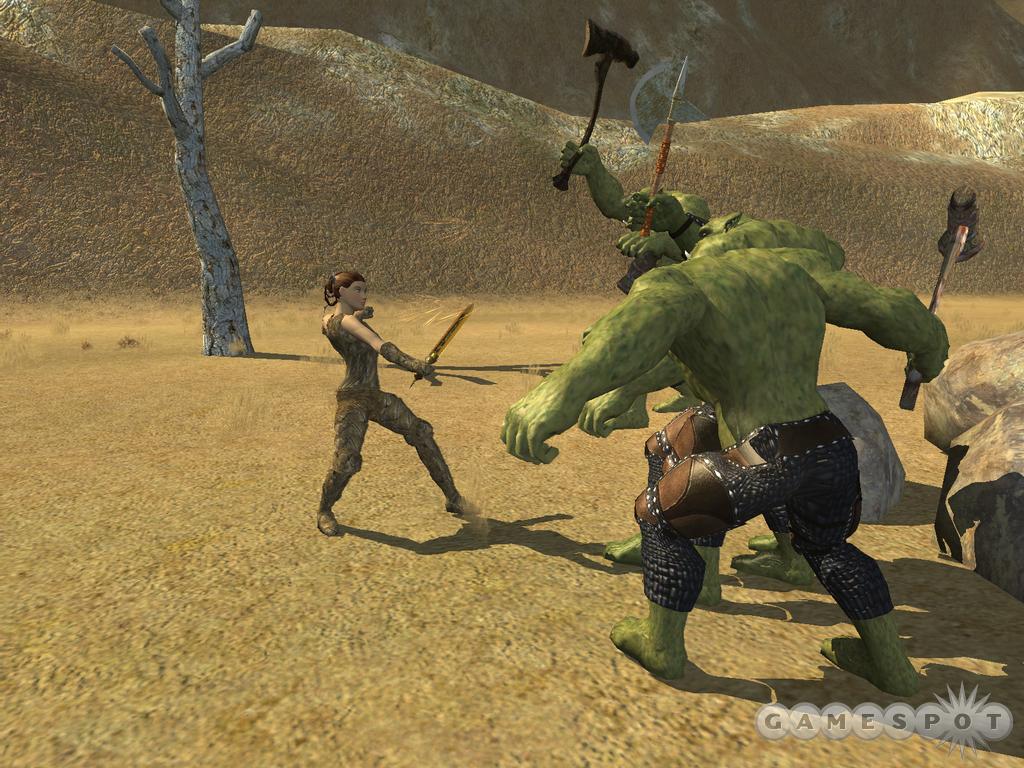
GS: Speaking of which, could you elaborate on the ways in which you're designing EverQuest II's time commitment? Many online games, EverQuest included, involve "downtime," which means that after fighting monsters, you must sit and wait to heal from your wounds, and you must recover magic power in order to fight again. How exactly will downtime be reduced? How is gaining levels going to be less of a grind. That is, gaining levels can be a time-consuming and sometimes repetitive process of fighting the same monsters over and over? Will character advancement be faster overall?
CC: Due to the fact that EverQuest II is a persistent, on-demand entertainment service, our focus is less about reducing the overall time commitment and more about creating enjoyable experiences in accessible chunks of time. We want you to enjoy your playtime so that you will keep playing, rather than forcing you to play to keep up. This is why the majority of the content in the game is centered around single-group activities that take about two hours to complete. Although players will always have the option of "grinding" through levels purely for the sake of gaining that next level, we want to ensure that there is enough adventure out there to entertain players at a more casual pace.
How Can I Be a Hero?
GS: What sort of options, specifically, will casual players have available with only an hour or two to play each session? Could you give us some examples? Also, how productively will players be able to play solo--if they can't find a hunting party--and for how long? After they reach a certain level, will players find it too hard (or even impossible) to go it alone?
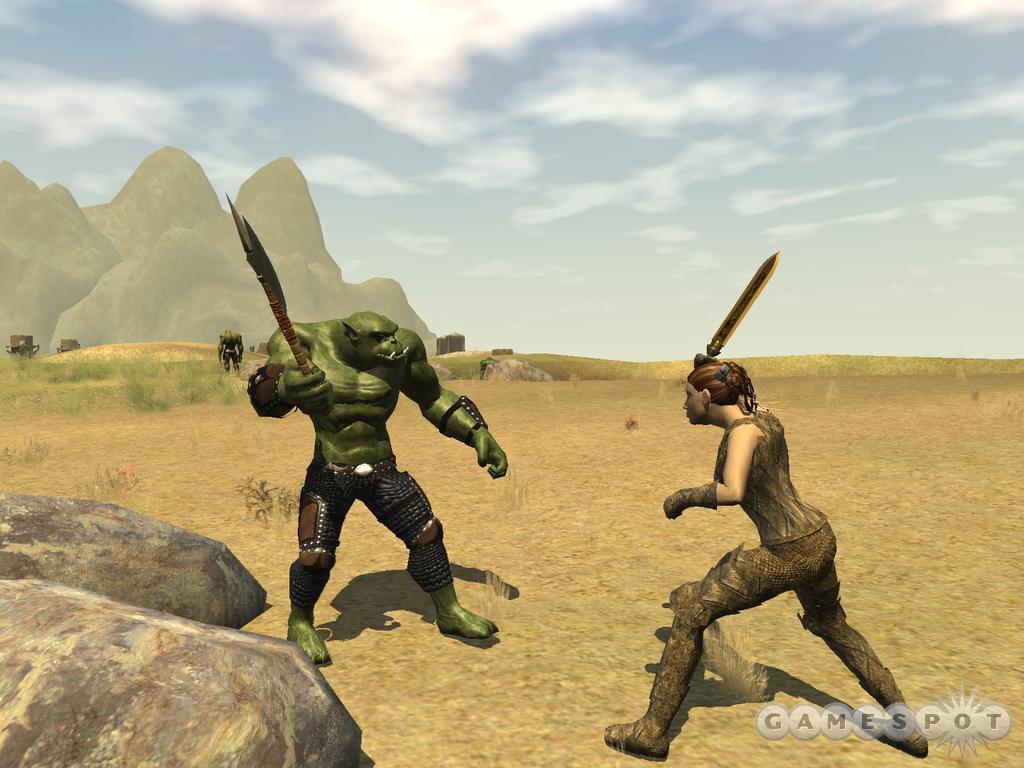
CC: We're putting together a lot of content for EverQuest II, and we're organizing it by how much time players have. For instance, we'll have "task-based quests" (such as those common to trade skills), which will require less than a half hour to complete and are designed to be accomplished by a single player. We'll also have "lore-based" quests that will require more time for exploration and travel but should be doable within an hour to an hour and a half. Larger quests, group quests, and instanced encounters are all designed to take the majority of a casual player's evening (two to three hours). Instanced raid zones--usually home to exceptionally powerful enemies that require a group effort to defeat--will require the most time. They'll be played in four-hour to six-hour blocks on a weekend.
In addition, the world of EverQuest II will also have plenty of open-ended solo and group content. Although players will find groups to be the most efficient form of progression, they'll basically all be able to solo their ways to level 50.
GS: A criticism that is common to online RPGs in general is that players often feel like they're simply one player playing a game, with no real chance to be a hero or to make a difference in the world. How will EverQuest II help players distinguish their characters from other people's? What kind of activities and quests will they be able to perform to change the face of Norrath?
CC: EverQuest II will provide a series of unique, one-time "pioneer quests" that will let players make their marks on the world. Each quest will result in an in-game marker that will store the player's name, guild, and date of accomplishment. Players will be limited in the numbers of specific types of pioneer quests they can complete, which encourages competition and gives everyone a chance at fame. Further pioneer quests will be added later, at all level ranges, to foster an ongoing sense of accomplishment. But remember, these quests will no doubt be highly contested, so having a chance to make your mark and actually succeeding at it will be two very different things in EverQuest II.
GS: Give us an update on the trade skill system in EverQuest II and the role of the new artisan class. What kinds of items can this profession make? What lessons have you learned from the economy systems of the original EverQuest and Star Wars Galaxies, and how are you applying them to EverQuest II?
CC: Trade skill processes in EverQuest II are actually based on our combat system. Instead of attacking a hostile orc, players will "attack" a specific process using a trade skill item. Throughout the trade skill round, players will succeed or fail at a number of minor trade skill attempts. These attempts will add up to the overall progress for a given recipe. Players can counter the failures (or other random process-based occurrences) with trade-specific arts.
Artisans will be able to produce a wide variety of items. While tough monsters will drop highly desirable loot, an artisan's key strength lies in his or her ability to customize the form that the end product will take. For example, the ancient dragon Nagafen could drop a "cloak of flames" item, along with a scale component. The cloak is what it is, and it has to be equipped and used in a certain way. The scale, however, can be used by the artisan to create many different products that share similar properties with the cloak.
GS: We've understand that the development team's goal is perhaps not to directly participate in player communities, but rather, to give players all the tools they need to build communities around the game. What kind of tools and options are being given to players to help them play together in EverQuest II?
CC: Players will be able to create and join both families and guilds upon release. Each of these social structures will provide a variety of player-based controls for member listing and status. The main distinction between the two types is that guilds compete with one another for a city's favor while families are informal, noncompetitive structures.
GS: Finally, is there anything else you'd like to add about EverQuest II at this point?
CC: The EverQuest II development team is always interested in player reactions to the information we release. Many team members quietly browse the various posting sites to get a feel for player opinion. Although Moorgard's name is the most common one you see, rest assured that there are dozens of other development eyes interested in reading what you have to say.
GS: Thanks, Chris.
Got a news tip or want to contact us directly? Email news@gamespot.com
Join the conversation